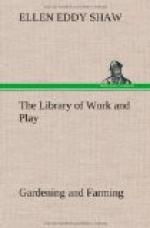“Not a word outside, mind you, not one word. Prove that girls can keep a secret.”
“We solemnly promise,” said Katharine for the others.
“Look,” cried Elizabeth, “there comes Jack; what shall we do?”
“Out this way,” quietly replied the man, almost sweeping seven happy little girls out of the door. “Now, cut and run.” And off they scampered over the fields.
IV
GARDEN EXPERIMENTS PERFORMED INDOORS
“The meeting is called to order,” began Jay. “To-night, so The Chief says, each fellow has some special thing to talk about. Albert will have an accident with that bottle unless he begins right off, so tune up, Savage.”
“This bottle is full of vinegar. I might have brought a lemon or anything else acid. This blue paper is called litmus paper. I got it at the drug store for ten cents. Just look right here, and you will see magic worked. I shall put some vinegar on this piece of paper. See!”
“Turned red as quick as scat!” said Jack.
“Litmus will always turn red when any acid gets on it. I’ve tried several acids at home. It works every time,” went on Albert as if no one else had spoken.
“I cannot see what this has to do with gardens.” began Philip.
“Now you keep quiet until I finish. Haven’t you fellows heard your fathers talk about sour ground? Well, that means acid soil.”
“Why, we have a piece of ground, where sorrel grows thick; father says that is sour,” added George.
“Just a minute, Albert,” broke in The Chief; “that is one way, George, that farmers tell a sour bit of land. Weeds grow thickly over such ground, but as George has said, sorrel is likely to predominate. Go on, Albert.”
“Any soil may be tested with this litmus. The Chief calls this the scientific way of going at it. I was able to get a little soil from our future garden plot, and I’ll find out right now if it’s acid.” Albert opened a small box which was full of soil that looked quite clayey. He wet a piece of litmus and buried it in the soil.
“We’ll have to leave this a few minutes, and I’ll finish what I have to say. If soil is very acid it has to be changed back again.”
“Back again to what?” asked Jack.
“Why, back again, so it isn’t acid,” Albert continued, decidedly confused.
“I’ll help you a bit,” and The Chief came to the rescue, “Get that big bottle over there, Albert.” Albert brought the bottle. In it was a liquid clear as water.
“Taste it, Peter,” and The Chief handed Peter a little in a small glass.
“Why it doesn’t taste like much of anything; sort of flat.”
“That’s it exactly, Peter. It certainly is not an acid, is it?” Peter shook his head. “It is lime water and does not belong in the acid class, but to one which is exactly opposite to the acids, the alkalies. Soils ought to be neither acid nor alkaline, but neutral, as it is called. An alkali will help make neutral an acid. If the soil is acid it is bad for your crop. Put a little lime water on the litmus which the acid has turned red.”




